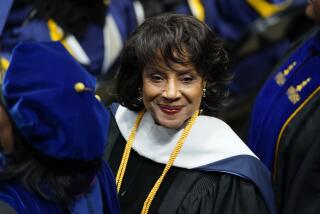Advocate for Poor May Head Medical College in Watts
- Share via
Dr. Reed V. Tuckson, the outspoken former commissioner of public health for Washington, D.C., and an advocate for improved health care for the disadvantaged, has tentatively agreed to become president of the Charles R. Drew University of Medicine and Science in Watts.
Tuckson said Tuesday that he has verbally accepted the offer and is negotiating an agreement with the school, one of only four minority medical schools in the country and one plagued in recent years by problems of money, management and image.
Tuckson’s appointment would bring to the university a national figure in public health with a reputation as an articulate spokesman on minority health issues. He is also an administrator with experience in the political world to which Drew must turn for funding.
“This is an extraordinary opportunity to make a difference in this country,” said Tuckson, most recently with the March of Dimes. “It is so obvious when you walk there, when you go through that community, when you see the statistics on death and suffering and human misery.”
The 25-year-old university views its mission as conducting medical education and research while serving the minority community that surrounds it, thereby preparing health professionals to treat and care for that community and others like it.
The university includes a College of Medicine, College of Allied Health, International Health Institute, medical magnet high school and various community programs. The faculty provides care for patients at Martin Luther King Jr./Drew Medical Center.
Funding for the university comes from many sources, including federal, state and county contracts, among them a multimillion-dollar operating agreement between the county-run medical center and the university.
In recent years, however, Drew has faced serious financial problems, which in 1988 necessitated layoffs and salary cuts. At the same time, independent auditors accused the university of sloppy financial practices and inadequate controls.
In addition, Drew has had difficulty recruiting and retaining faculty members, in part because of pay levels. Some physicians’ salaries fall in the 30th percentile when measured against university medical salaries nationwide--a fact Drew officials blame on county funding.
Dr. Henry Williams, the interim president, said Tuesday that “the school’s financial position right now is probably stronger than it has been in at least three or four years.” But he said Drew would need “a considerable infusion of money” over the next five years to progress.
In recent months, the university has implemented an attrition policy under which certain positions are eliminated when they become vacant. That is just one of several steps taken recently “to make sure that we stay within the budget,” Williams said.
“I think there is a perception problem here about the image of this university that has to be faced,” said Dr. Ezra Davidson, chairman of the department of obstetrics and gynecology at the university and the medical center.
“Much of that (problem) has been unfounded and unjustified,” he said. “But I think it has to be recognized and confronted” and that the administration must make it a priority to improve the university’s image.
Tuckson, a Washington, D.C. native whose father recently retired as associate dean of the School of Dentistry at Howard University, is a graduate of Howard and of Georgetown Medical School. He also studied health care administration at the Wharton School of Business.
He became public health commissioner for the District of Columbia in 1986 and developed a reputation as a popular and passionate advocate--in particular, on issues such as infant mortality, AIDS, prenatal care and the high death rates in minority communities.
“I don’t think that any urban health commissioner, confronting the magnitude of challenges that we confront with the absolutely disgraceful lack of resources, can really point to individual successes,” Tuckson recalled Tuesday.
“If I did anything well there, I would say I was able to focus the attention of the city . . . on the health challenges that confronted us and the consequences of those challenges,” he said.
Tuckson resigned in January, 1990, when he was faced with a new onslaught of budget cuts. He has served since then as senior vice president of the March of Dimes, managing its programs and serving as a national spokesman on issues in infant and child health.
More to Read
Sign up for Essential California
The most important California stories and recommendations in your inbox every morning.
You may occasionally receive promotional content from the Los Angeles Times.













